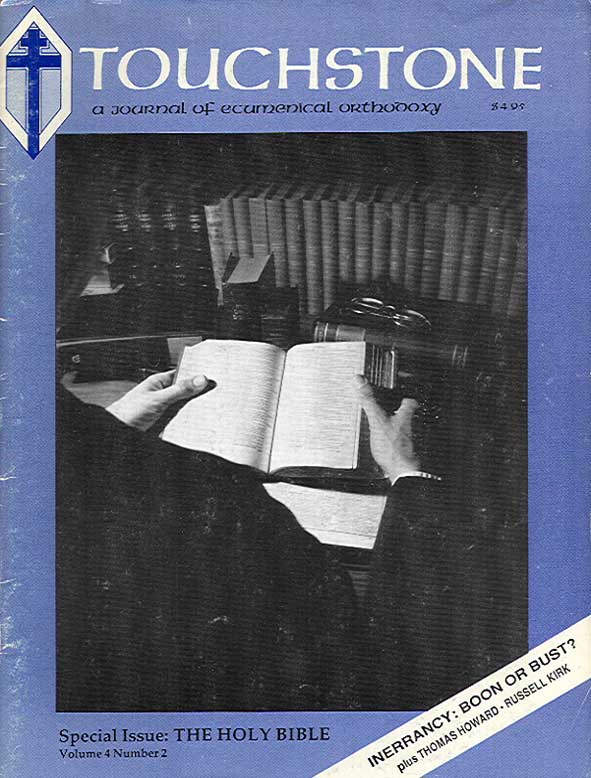Recovering the Spiritual Sense of the Scriptures
An Interview with Fr. Paul Quay, S.J.
Fr. Quay, you have been studying the place and role of the spiritual sense of the Scriptures, and you have just finished writing a book on this subject. It is something which in the past has loomed large in the Church’s tradition. What is your particular concern with this subject?
I believe that the problem raised by Marcion back in the second century is still very much with us, namely the dropping of the Old Testament: Why do we need the Old Testament, if the New Testament is the complete fulfillment of the Old? Even if one admits that there is a spiritual sense in the Old, in which Moses is a type of Christ, Abraham a type of the Christian believer, and so forth, why do we need it? If you know what all these things are prefiguring, why do you need the prefigurement anymore, except for apologetic uses? If for the Christian the Old Testament’s sole purpose is to point to Christ and if the Gospels and Epistles give us Christ, why bother? The attitude often seems to be that we could use the Old Testament as good literature, but why not drop the lists of the Edomite kings and all that stuff? Maybe we could make for ourselves a nice little book with some outstanding poetry and gorgeous prophetic passages—squeeze 1,000 pages into maybe fifty or sixty.
I think that for Catholics since Vatican II the problem is that there is an enormous emphasis on a sentimentalized, and now psychologized, attitude developed from the view that the New Testament is an adequate statement of all that Christ came to teach us. This fails completely to recognize that our Lord in actual history was speaking to his contemporaries, a people well-prepared. Therefore, he didn’t have to go over the same points again. He taught the first semester through his word in the Old Testament; the Gospel was the second semester. He didn’t have to go back and reteach the first semester.
So, for example, one of the things which the gay rights movement has been pushing is that you have no direct condemnation by Jesus of homosexual activity—at least nothing recorded in the Gospels. Then they make excuses for what is in the Epistles. But the point they ignore is that Jesus didn’t have to speak to this issue. Every Jew knew that homosexual activity was simply outside the range of the Law on any interpretation possible. The same thing goes for many other things. So, I think that Christians today need the Old Testament to get the first semester.
Beyond that, we have lost the spiritual sense of the Scriptures, which has always been something vital to the core doctrine of the Church. Here, the spiritual sense of the Old Testament plays a very important role. From the earliest days it was this sense which separated the Christian from the Jew. The Christians admitted that the Jews knew the Old Testament in its literal sense. There was no argument about Jewish competence to judge the historical/literal sense of these Scriptures. But what made the Christian a Christian was that he could read the Old Testament and every word in it was about Christ and the things which belong to Christ. That is the spiritual sense of the text.
For 1,500 years this was recognized. Then with the Reformation controversies the emphasis began to shift. Luther’s position was basically a late medieval position. He recognized that theological controversies are not settled by arguments based on the spiritual sense, but on the literal. Still, Luther himself accepted the spiritual sense in principle. Calvin, on the other hand, rejected it, as far as I can see, except where the New Testament expressly declares it to be present. Thereafter it became increasingly apparent in the controversies that what was being argued about was the literal meaning of the Scriptures. So, for example, did the 6th chapter of the Gospel of John refer to the Eucharist or not? This was not argued on the spiritual sense, but rather on the basis of what the Greek words of the text, properly understood, said and meant in their literal sense.
I believe that Protestantism has always tended to be caught up in issues arising from the literal. But I would say that it was not until later, about the time of Galileo, that we Catholics became absorbed to such a degree in issues of the literal sense. But from that period on, all controversies, without any exception that I know of, hinged on the literal meaning of the text—for Catholics as well as non-Catholics. Catholics have suffered less, at least until very recently, because the Church’s doctrine had already been derived from the spiritual sense.
Define for us more precisely what you mean by the literal and spiritual senses.
The literal sense is that which any suitably backgrounded human being, who knows the language and can understand the basic concepts, would derive from the words of the text. So what a pagan properly educated would get from the text is the literal sense.
The spiritual sense, on the other hand, is that meaning which is present only because God chose to put it there. Actually, it is not a sense of the Scriptures, the writings themselves, strictly speaking. It is a sense of the things about which the Scriptures speak. Things have actual meanings, like human sexuality with all its natural symbolism—meanings which are built into nature by God, and also reveal something about the divine nature, reflecting it on a created level. But, beyond this, God can also assign spiritually significant meanings which are not built into the nature of the thing.
James M. Kushiner is the Director of Publications for The Fellowship of St. James and the former Executive Editor of Touchstone.
subscription options
Order
Print/Online Subscription

Get six issues (one year) of Touchstone PLUS full online access including pdf downloads for only $39.95. That's only $3.34 per month!
Order
Online Only
Subscription

Get a one-year full-access subscription to the Touchstone online archives for only $19.95. That's only $1.66 per month!
bulk subscriptions
Order Touchstone subscriptions in bulk and save $10 per sub! Each subscription includes 6 issues of Touchstone plus full online access to touchstonemag.com—including archives, videos, and pdf downloads of recent issues for only $29.95 each! Great for churches or study groups.
Transactions will be processed on a secure server.
more on Bible from the online archives
more from the online archives
calling all readers
Please Donate
"There are magazines worth reading but few worth saving . . . Touchstone is just such a magazine."
—Alice von Hildebrand
"Here we do not concede one square millimeter of territory to falsehood, folly, contemporary sentimentality, or fashion. We speak the truth, and let God be our judge. . . . Touchstone is the one committedly Christian conservative journal."
—Anthony Esolen, Touchstone senior editor












